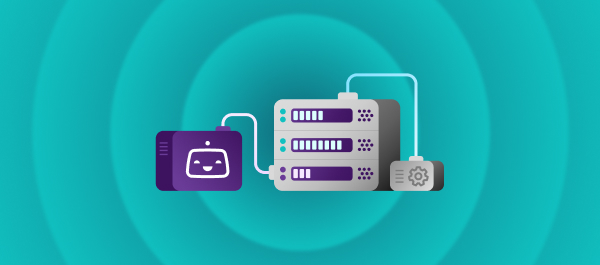Kicking off our in-depth series on DevOps, this introductory post dives into the heart of DevOps and mobile DevOps. DevOps, or mobile DevOps, is a blend of practices and tools designed to increase an organization's ability to deliver applications faster. It’s a philosophy or a way of working that emphasizes collaboration and communication between software developers (Dev), IT operations (Ops), and security teams. This blog post unpacks DevOps and Mobile DevOps and highlights their differences.
What to expect in this series
- What is DevOps? Or Mobile DevOps? (you are here)
- The role of Release Management in DevOps
- What is DevSecOps? A look into security and DevOps
- The impact of DevOps: Comparing organizations with and without DevOps practices
DevOps Explained
DevOps eliminates siloes, automates repetitive tasks (like testing and deploying software), and implements continuous improvements for teams as they ship code. Where DevOps focuses on software¹ development, Mobile DevOps hones in on software development for mobile only. DevOps can be broken down into a DevOps philosophy, a DevOps platform, and DevOps tools.
A DevOps philosophy
For organizations to successfully implement DevOps, or Mobile DevOps, a fundamental shift is needed in both working methodologies and team collaboration. This shift goes beyond just changing tools or processes; it's about fostering a culture of shared responsibility and continuous improvement.
By integrating Continuous Integration and Continuous Deployment (CI/CD) practices, DevOps teams² are able to develop a shared workflow understanding, refine their expertise, and utilize effective tooling, all of which are crucial for delivering superior software products. This collaboration extends throughout the entire Software Development Lifecycle (SDLC), encompassing building, testing, and continuous feedback.
Adopting DevOps is not just about technological advancement but about transforming the very ethos of how teams collaborate and achieve their goals. Silo-less.
A DevOps platform
DevOps, at its core, is about revolutionizing how organizations deliver value through a harmonized process bolstered by effective software tools like Bitrise.
Bitrise is a mobile DevOps platform with a comprehensive toolset for development teams building specifically for mobile. That’s part of what makes Bitrise different - the mobile focus. Bitrise offers essential mobile-first CI/CD tooling alongside a full suite of DevOps tools to address the specific challenges of mobile app ideation, development, and releases by shortening release cycles.
Bitrise as a Mobile DevOps Platform isn’t just a CI/CD pipeline. It's a complete suite of tools that accelerates and increases the reliability of mobile app releases. DevOps takes you beyond the manual build process, automating repetitive tasks that often complicate and slow down app development.
What are DevOps tools?
DevOps tools is the collective of tools that make up the DevOps platform. It encompasses a broad range of tools that play a pivotal role in bridging the gap between software development (Dev) and IT operations (Ops). These tools are specialized solutions designed to enhance collaboration, streamline processes, and improve the efficiency of software development and deployment. DevOps tools facilitate CI/CD, enable efficient code management, and ensure seamless deployment, all while maintaining high standards of quality and security. In the case of Mobile DevOps, the tools are more specialized toward the needs of mobile development teams.
Have a glance at how some of our mobile DevOps tools support the different DevOps lifecycle stages: remote build caching, Bitrise Insights, Release Management, mobile-specific testing, mobile-app-developer-first focus, automated code signing
Mobile DevOps explained
What is mobile DevOps, and how is it different from DevOps?
Mobile DevOps diverges from traditional DevOps by specifically addressing the complexities of mobile ecosystems. While traditional DevOps is applicable across all software types, Mobile DevOps is tailored to the unique challenges of mobile app development, focusing on two main areas: 1. Platform-specific limitations and 1. The focus of shift-left practices.
1. Platform-specific limitations: A core focus of mobile DevOps
Mobile developers encounter challenges not typically faced by their counterparts in traditional software development, such as device fragmentation, optimizing performance in constrained environments, and navigating platform-specific features and APIs. These challenges are compounded by the restrictions (and strict processes) mobile platforms like Apple and Google place on development and distribution practices, including the need for code signing and store approvals. Mobile DevOps seeks to mitigate these obstacles by automating routine tasks, simplifying the process of meeting platform-specific requirements, shifting left to mitigate post-release expensive mobile app fixes, and more thereby enabling smoother mobile app releases.
2. Shift-Left practices: Enhancing quality from the start
A pivotal aspect of Mobile DevOps is its emphasis on 'shift-left' practices, which advocate for testing and quality assurance early in the development cycle. This approach is not only more cost-effective but also critical in the mobile domain, where the stakes are significantly higher. Faulty releases and post-release fixes can significantly affect user satisfaction and retention and in the worst case, lead to immediate app uninstalls. This directly impacts your monthly active users (MAUs) and ultimately, the overall success of your mobile app. In the mobile world, users are less likely to give your app a second chance once they've had a poor experience. This heightened risk underscores the importance of early validation and quality assurance to avoid costly post-deployment corrections and to maintain a positive user experience. By prioritizing early validation and quality checks, Mobile DevOps aims to prevent costly fixes after deployment and ensure a positive user experience.
In summary, Mobile DevOps adapts traditional DevOps principles to the mobile environment, addressing specific mobile challenges and emphasizing proactive quality assurance to enhance app development and deployment.
Experience the difference mobile DevOps can make for your development team. Start for free with Bitrise today.
The Bitrise Mobile DevOps platform
Bitrise streamlines the entire app lifecycle from coding to deployment. With tools like Build Caching to reduce feedback loops and build duration, Release Management for smooth app store releases, and Bitrise Insights to pinpoint CI and operational bottlenecks, our mobile DevOps platform transcends the traditional boundaries of CI/CD, addressing the full lifecycle of mobile app development.

Security and DevOps
DevOps recommends the shift-left testing principle to integrate testing early in the software development lifecycle, ensuring that issues are identified and resolved sooner, thereby reducing the cost and time associated with post-production fixes.
This approach aligns with the CI/CD practices central to DevOps, facilitating faster and more reliable software releases. It also emphasizes the importance of proactive problem-solving and efficient workflow management, enhancing quality assurance and code quality. What's more, the integration of DevSecOps into this process signifies a critical evolution, embedding security measures from the outset of development projects.
Unlike traditional DevOps, which focuses on accelerating software delivery through collaboration between development and operations, DevSecOps prioritizes security at every stage, fostering a more secure, compliant, and risk-mitigated development pipeline. An example of this integration into the DevOps methodology is the use of Static Application Security Testing (SAST) tools, which scrutinize code against OWASP standards. Tools like the Mobile Security Framework (MobSF), available on GitHub, are robust examples of how SAST can be effectively employed to ensure compliance and security from the get-go. By embedding security measures such as MobSF into the DevOps methodology, not only is a more robust mobile app but team collaboration is also enhanced from the beginning. This significantly reduces the likelihood of encountering security issues post-release.
Engineering and DevOps
The role of the DevOps Engineer
As previously mentioned, the guiding principles of a DevOps approach hinge on breaking down traditional silos and fostering a philosophy where collective responsibility is embraced. In this context, DevOps Engineers³ play a pivotal role. They are the individuals at the forefront, championing and guiding this new way of working.
DevOps Engineers manage the technical aspects and also ensure effective communication and strategic planning across all stages of the SDLC. This integrated approach ensures continuous improvement, fosters innovation, and accelerates the delivery of high-quality software, aligning closely with the needs of the organization and its users. A true DevOps platform catalyzes this collaborative ethos and philosophy. It enables teams to iterate faster and innovate together, as it allows every team member, irrespective of their role, to contribute effectively.
Platform Engineering vs DevOps
Platform Engineering and DevOps, though distinct disciplines have a lot in common. In short, it enables developer self-service, is a central platform of tooling and workflows, enhances the development lifecycle with automation tools, and has the DevOps philosophy at its core.
Platform Engineering
Platform Engineering focuses on constructing and managing robust platforms and infrastructure, enabling developers to deploy applications efficiently. Mostly, their mission is technical and to internal engineering teams.
The goal of Platform Engineering is to build an enticing platform for other engineers that serves as a centralized hub, not just for DevOps tools, but for a wide array of reusable tools addressing cross-cutting concerns. While these tools are predominantly developed in-house, platform engineering can also transcend the confines of DevOps, encompassing all aspects of Developer Experience (DevEx) related projects. This includes the creation of shared libraries, such as API clients or authentication systems, intended for reuse across multiple features or platforms. To ensure efficient maintenance and seamless integration of these diverse tools, a dedicated central platform team oversees the tool stack. This plays a key role in onboarding internal teams onto the DevOps platform, ensuring a smooth integration process, and promoting a cohesive engineering ecosystem
When Platform Engineers release new features, their primary audience and collaborators are the internal teams actively working with these tools. This creates a cohesive environment where the development and maintenance of the platform are closely aligned with the needs and feedback of its users.
DevOps
DevOps bridges development and operations, emphasizing team integration to optimize the software development lifecycle.
Its primary goal is to break down silos between teams, fostering an environment where software is created that users repeatedly engage with (more on the goals of DevOps here). This approach incorporates practices like CI and CD, along with proactive monitoring, to ensure seamless operations throughout the DevOps lifecycle.
Teams engaged in DevOps can choose to either maintain their tools independently or opt for maintenance support from a DevOps provider, such as Bitrise. When releasing features, DevOps teams generally focus on an external audience. However, a crucial part of their role also involves empowering cross-functional teams (XFN). This enables these teams to develop and operate autonomously, reducing their dependency on others.
The intersection of these two fields lies in their mutual goals: the ability to self-serve, building a platform engineers want to use that is user-friendly, and solving problems for customers.

Frequently asked DevOps questions
How do CI/CD and DevOps relate?
CI/CD is the backbone of DevOps, providing the technical foundation for its principles. Continuous Integration (CI) is about integrating code changes frequently and automatically testing those changes, ensuring codebase integrity and encouraging small, manageable updates. Continuous Deployment (CD) extends this by automatically deploying code changes after they pass the CI tests. This seamless integration and deployment process embodies DevOps' goal of streamlining software delivery, enabling rapid, consistent, and automated flows from development to production.
What is observability in DevOps?
Observability in DevOps provides clear, actionable insights into your applications, encompassing Application Performance Monitoring (APM), tracing, and health metrics. It's about diagnosing not just what issues are occurring but understanding their root causes for quicker, more effective problem resolution.
Bitrise enhances this capability with Bitrise Insights, a tool designed to offer a comprehensive view of your development processes rather than the end-user experience. This Bitrise add-on equips engineers and mobile developers with actionable data on builds, tests, build caching, Git activity, resource utilization, and Bitrise credit usage, all aimed at boosting efficiency and smoothing your development workflow. It's crucial to note, however, that Bitrise Insights focuses on improving development operations and does not extend observability into the end-user's application experience.
How do agile and DevOps interrelate?
Agile and DevOps are complementary forces that together drive software development. Agile focuses on iterative development and responsiveness to change, emphasizing collaboration and, a focus for us at Bitrise, customer feedback. DevOps extends these Agile principles into the realm of operations, breaking down silos between development and IT operations. Together, they create a harmonious software development cycle: Agile plans and guides the development, while DevOps ensures efficient, reliable delivery and deployment. This relationship enhances an organization's ability to develop, test, and release software rapidly and reliably whilst embodying a comprehensive approach to continuous improvement and efficiency.
What are the fundamentals of DevOps?
The Fundamentals of DevOps encompasses a broad range of elements that are foundational to the DevOps philosophy and emphasize collaboration, integration, and communication between software development (Dev) and IT operations (Ops) teams.
How can a DevOps team take advantage of Artificial Intelligence (AI)?
AI can be a powerful ally for DevOps teams, offering advanced analytics, automation, and predictive insights. AI algorithms can analyze vast amounts of data generated during the DevOps cycle, helping teams to predict issues, automate routine tasks, and optimize processes for efficiency and effectiveness. AI-driven analytics can provide deeper insights into system performance and user behavior, enabling more informed decision-making. Moreover, AI can aid in automating complex, time-consuming tasks like code reviews, security checks, and system monitoring, thus freeing the DevOps team to focus on more strategic and creative tasks. In essence, AI can elevate the capabilities of a DevOps team, making the software development lifecycle more efficient, proactive, and innovative.
What is a common misconception about agile and DevOps?
It’s easy to confuse Agile and DevOps as they are complementary and share some of the same principles. However, agile and DevOps are distinctly different in their approach and focus.
Agile
Agile is primarily a set of principles and methodologies for software development that emphasizes iterative development, customer collaboration, and flexibility to change. An agile approach is more about how software is developed and uses methodologies to do so like Scrum, Kanban, and Extreme Programming (XP). The focus of agile is on enhancing the software development process, improving product quality, and accelerating delivery to meet customer needs.
DevOps
Now DevOps, on the other hand, extends beyond just software development to include IT operations (Dev+Ops). It emphasizes collaboration between developers and operations teams by breaking down team siloes, using automation of software delivery processes (CI/CD), and operational efficiency. DevOps seeks to bridge the gap between development, QA, and operations, ensuring continuous integration, delivery, and deployment of software.
While Agile methodologies can improve the speed and adaptability of software development, DevOps aims to optimize and automate the entire lifecycle of software deployment and operations. In many organizations, Agile principles are applied in the development phase, while DevOps practices are implemented to streamline the subsequent stages of the software delivery process.
What is orchestration in DevOps?
DevOps orchestration is about automating and optimizing the coordination and management of concurrent DevOps processes and systems, which is key to achieving the speed, efficiency, and reliability goals of the DevOps philosophy. The goal of DevOps orchestration is to reduce production issues and time to market.
To conclude
While DevOps focuses on improving collaboration, automating software delivery processes, and integrating teams to enhance the speed and reliability of application development across platforms, Mobile DevOps hones in on the unique challenges of mobile application development. It addresses device fragmentation, optimizes performance within mobile environments, and streamlines the lifecycle management of mobile apps.
As the mobile landscape, its practices, and terminology continuously evolve, we’ll aim to keep you updated with the latest roles, practices, and nuances of DevOps and Mobile DevOps, ensuring you stay informed and ahead.
Join organizations already building with Bitrise’s suite of mobile DevOps tools, and experience the difference mobile DevOps can make for your team. Start a free trial today.
Clarification of certain terms
- ¹Software: Includes, but is not limited to Mainframes, embedded systems, machine learning, etc.
- ²DevOps teams: In this article, we use the term 'DevOps teams' as it is commonly recognized and employed within software development organizations to describe their teams. However, it's crucial to understand that the essence of DevOps lies in the principle that responsibilities should not be confined to a single team. Therefore, when we talk about 'DevOps teams', we're referring to any group that practices DevOps.
- ³DevOps Engineer: In this article, we use 'DevOps Engineer' to describe individuals playing a critical role in the DevOps process. It's important to recognize, however, that using this title might seem to contradict the foundational DevOps principle of transcending traditional roles and responsibilities. DevOps is about fostering a culture of collaboration and shared responsibility across all members of an organization, not isolating tasks to specific titles. The reality in many organizations, though, is that 'DevOps Engineer' has become a common designation for professionals who facilitate and guide these collaborative efforts. This acknowledgment does not undermine the essence of DevOps but reflects the pragmatic ways in which its principles are applied in the workforce. Thus, when we mention 'DevOps Engineers,' we're acknowledging the practical role these individuals play in championing and guiding the collaborative, interdisciplinary approach that DevOps embodies.




